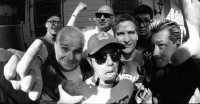Trying to squeeze the mammoth sound and fury of The Voodoo Glow Skulls into a few tidy words is a nearly impossible task. Despite hundreds of cheesy references to hot sauce and valiant attempts to find the perfect synonyms for "amazing" and "furious," many good writers have tried. . . and failed. There is simply no one word that will ever slice into your eardrums as powerfully as the sharply ordered chaos of a Voodoo song. Unlike the legions of ska/punk bands in the industry, The Voodoo Glow Skulls defy easy categorization, whether it is in a record review or at home in your music collection. The Voodoo Glow Skulls stand alone as a ferocious testament to individuality and the raw, raging power of rock and roll. Nowhere is this vicious hunger more apparent than in their new release on Epitaph Records: Symbolic.
Releasing Symbolic in the year 2000 marks twelve years of sweat and hard work for Voodoo, having began as a four-piece in a sweltering bedroom practice space in 1988. The unwavering intensity that has contributed so much to their current success was present even then: brothers Frank, Eddie and Jorge Casillas (Vocals, guitar, and bass, respectively) and close friend Jerry O’Neill (drums) practiced almost every day for two years despite angry neighbors and the even angrier California heat. In 1990, Voodoo became kings of the local backyard party scene and began playing at the now-legendary Spanky’s Café in their hometown, Riverside.
Always seeking to push their musical creativity to a new level, the band put the word on the street that they were looking to add a horn section to their punk rock mania- an almost unheard of idea in early 1991. Fervent Voodoo fans Joey Hernandez (saxophone) and Joe McNally (trumpet) became part of the familia later that year, hopping into the van just in time for the band’s first national tour of many. All of the couch surfing and Top Ramen rationing of D.I.Y. touring soon began to pay off, as the band has built a fiercely loyal global fan base through its hard work. Since these early days, the band has extensively toured the United States, Europe, Japan, Mexico and Australia, both as headliners and as supporting acts for bands as diverse as The Mighty Mighty Bosstones, The Reverend Horton Heat, the Offspring, No Doubt, 311, and The Misfits.
Indie label Dr. Strange Records released Voodoo’s debut album Who Is, This,Is in 1992, attracting the notice of Epitaph Records who signed the band in 1993, right about the time Brodie Johnson(trombone) wandered into the band’s record store looking for a gig. The Voodoo Glow Skulls released their Epitaph debut Firme, in both English and Spanish, with producer GGGarth Richardson (Red Hot Chili Peppers, Rage Against the Machine) in 1995. Two groundbreaking releases followed: Baile de Los Locos in 1996 and Band Geek Mafia (with John Avila of Oingo Boingo producing) in 1998. Now, the band is poised and ready to send shockwaves through the scene with its most sonically potent and painfully honest release yet, 2000’s Symbolic.
Symbolic unites producer Brett Gurewitz (owner of Epitaph) with The Voodoo Glow Skulls in an electrified quest to find the true science of punk. The record’s title truly symbolizes everything that is righteous and powerful about this band: twelve years of unyielding devotion both to their fans and their musical ideals. Symbolic signifies both change (the band lost trumpet player Joe McNally to nine-to-five slavery in 1999) and the immutability of the band’s musical might. The title track "Symbolic" is a flaming battlecry that lyrically advocates The Voodoo Glow Skulls’ continual musical evolution and records their dizzying battle to maintain their individuality and transcend the limiting label of skacore.
At its pulsing heart, the music of Symbolic retains the frenzied fists of sound that have punched devoted fans silly throughout the years, while at the same time passionately bringing to the forefront the influences that have long underscored Voodoo’s music. Hip-hop bass and vocal rhythms dominate "Drop In" and "The Devil Made Me Do It," while thick heavy metal guitar rumbles through "Musical Therapy" and "High Society." At once dark harbingers of doom and riotous party crashers, Voodoo’s razor sharp horn section takes as much from classic funk as from traditional ska here, providing the brass muscle for Voodoo’s new sound. Two collaborations add even more flavor to Symbolic: Mark from Guttermouth spins his trademark chatter through the opening track "We’re Back" and the Reverend Jim Heath lends an interplanetary blast of rock and roll to the scorching "El Mas Chingon." The result of this revolutionary blend is more than punk, more than ska, and certainly more than any million "cores" out there. It’s just fucking good music, plain and simple, something Voodoo has been fighting for twelve long years to bring to the people.
